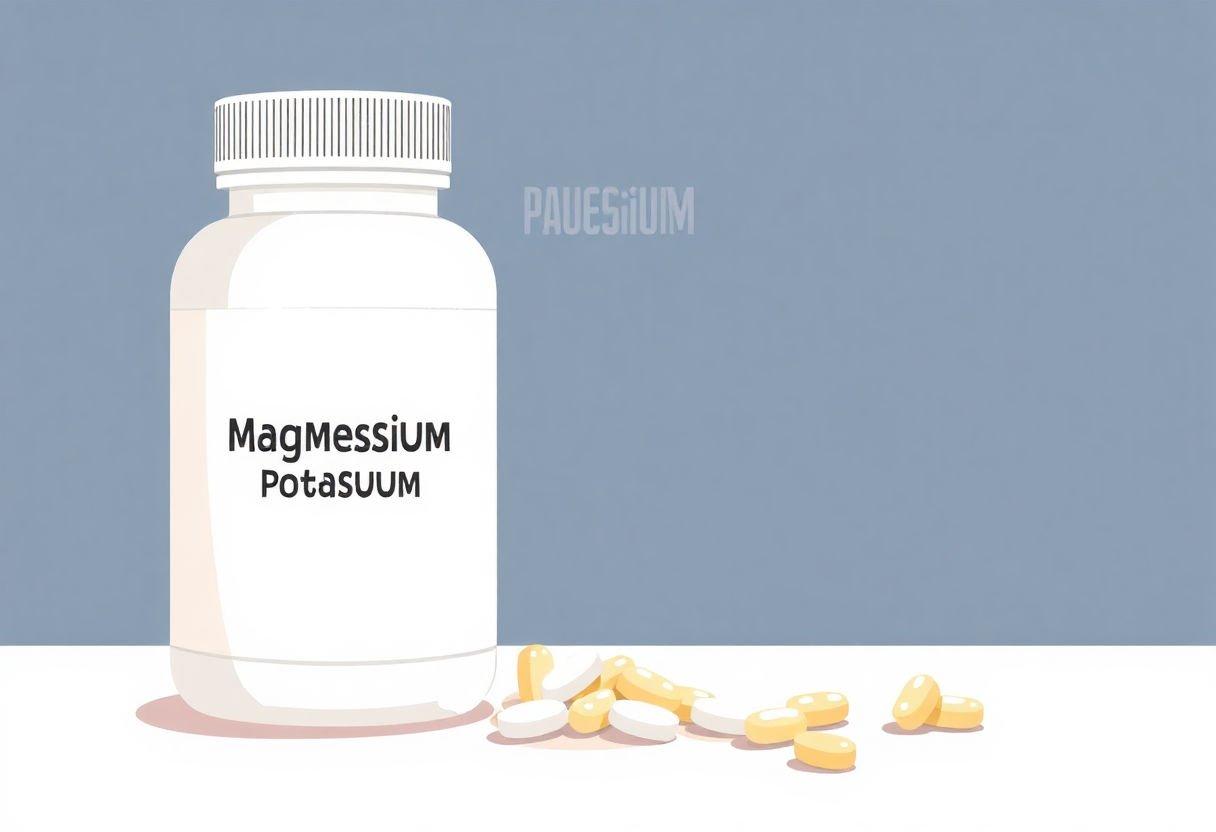In an era where maintaining optimal health is paramount, understanding the essential role of minerals like magnesium and potassium is crucial. These powerful nutrients are pivotal in supporting vital bodily functions, making their supplementation profoundly beneficial. This article will delve into the myriad advantages of magnesium and potassium supplements, highlighting their impact on bone health, neuromuscular function, blood pressure management, and heart health. Additionally, we will provide insights into safe dosages and effective combinations, encouraging an informed approach to supplementation. Embark on this journey to unlock the full potential of magnesium and potassium for enhanced well-being.
Key Takeaways
- Magnesium and potassium are essential minerals that significantly contribute to bone health, energy production, and neuromuscular function.
- Potassium supports vital bodily functions such as muscle performance, fluid balance, and nerve signaling.
- Magnesium supplements offer benefits including preventing deficiencies, alleviating anxiety, and improving sleep habits.
- Potassium supplements are advantageous for managing blood pressure, reducing stroke risk, and supporting cardiovascular health.
- Consulting healthcare professionals is crucial when considering these supplements to ensure safety and address specific health needs.
The Importance of Magnesium in the Body

Magnesium is an essential mineral that plays a pivotal role in numerous physiological processes within the body. It is significantly involved in maintaining strong and healthy bones. Approximately 60% of the body’s magnesium is stored in the bones, where it contributes to bone density and overall skeletal health. This mineral is also a co-factor in over 300 enzyme systems, which regulate diverse biochemical reactions, including protein synthesis, muscle and nerve function, blood glucose control, and blood pressure regulation.
One of the most critical roles of magnesium is in energy production. It aids in the conversion of food into energy by participating in the synthesis of adenosine triphosphate (ATP), the primary energy carrier in cells. Without sufficient magnesium, energy production becomes inefficient, leading to fatigue and decreased endurance.
Magnesium’s influence extends to the neuromuscular system, where it acts as a natural calcium blocker to help regulate muscle contractions. This function is vital in preventing excessive contraction and spasms, which can lead to conditions such as muscle cramps and restless leg syndrome. Furthermore, magnesium plays a crucial part in modulating nerve transmission and muscle relaxation, thus aiding in maintaining normal nervous system function.
For those concerned about cardiovascular health, magnesium is invaluable as it helps regulate blood pressure and promotes vascular health. Its ability to relax the arteries and improve blood flow contributes to a healthier heart, highlighting the importance of maintaining adequate magnesium levels in the body.
In summary, magnesium is indispensable for bone integrity, energy metabolism, and neuromuscular health, making it a key mineral for overall well-being.
Understanding Potassium and Its Functions
Potassium is a vital mineral essential for numerous bodily functions. Its primary role involves maintaining proper cellular function by regulating fluid balance within cells and tissues. This balance is crucial, as it supports normal cell function and overall homeostasis in the body.
One of the most critical functions of potassium is its role in muscle function. It aids in the contraction and relaxation of muscles, which includes the heart muscle, making it integral to cardiovascular health. Adequate potassium levels help in maintaining a regular heartbeat and prevent muscle cramps and spasms.
Additionally, potassium is pivotal for nerve signaling. It assists in the transmission of nerve impulses, thereby enabling communication between different parts of the body. This is essential for reflexes, the sense of touch, and other sensory functions.
Furthermore, potassium plays a significant role in blood pressure regulation. It counters the effects of sodium, helping to dilate blood vessels and prevent hypertension. This balancing act is vital for reducing the risk of cardiovascular diseases.
To ensure optimal health, maintaining appropriate levels of potassium through diet or supplements is important. Potassium-rich foods include bananas, oranges, potatoes, and leafy greens. However, in cases where dietary intake may be insufficient, potassium supplements can be a beneficial addition to ensure adequate intake. Always consult with a healthcare professional before starting any supplementation, especially for individuals with kidney disorders or those taking certain medications.
Health Benefits of Magnesium Supplements
Magnesium supplements offer a myriad of health benefits. A prevalent concern is magnesium deficiency, which can lead to a variety of health issues including muscle cramps, fatigue, and abnormal heart rhythms. Supplements serve as an effective method to prevent such deficiencies, ensuring adequate levels of this vital mineral in the body.
Furthermore, magnesium is recognized for its potential in helping reduce anxiety. It plays a crucial role in regulating neurotransmitters, which are essential for sending signals throughout the nervous system. By supplementing with magnesium, individuals may experience an improvement in mood stability and a reduction in anxiety symptoms.
Another notable benefit of magnesium supplements is their ability to improve sleep. Magnesium helps regulate the production of melatonin, the hormone responsible for sleep-wake cycles. It also binds to gamma-aminobutyric acid (GABA) receptors, contributing to calming the nervous system, which can help individuals achieve a more restful and rejuvenating night’s sleep.
The multifaceted benefits of magnesium supplements make them a worthy consideration for individuals seeking to optimize their health. Whether combating deficiency, alleviating anxiety, or enhancing sleep quality, magnesium supplementation provides an accessible means to support overall well-being.
Incorporating magnesium supplements into your routine could serve as a proactive measure in maintaining your health. Always consult with a healthcare professional to tailor supplementation to individual needs, thereby optimizing the potential benefits while minimizing risks.
The Advantages of Potassium Supplements
Potassium supplements offer a myriad of benefits that can significantly contribute to maintaining and enhancing your overall health. One of the primary advantages is their ability to manage blood pressure. Potassium helps to counteract the effects of sodium in your diet, thereby aiding in the dilation of blood vessels, which can lower blood pressure and reduce the strain on the cardiovascular system.
Moreover, potassium is pivotal in reducing the risk of strokes. As a consequence of lower blood pressure and improved vascular function, individuals with adequate potassium intake experience a reduced occurrence of stroke and other vascular complications. A study highlighted in various health publications indicates that a diet rich in potassium can lower the risk of ischemic strokes, making it a crucial element in a heart-healthy diet.
The role of potassium in supporting heart health cannot be overstated. It plays a vital part in regulating heartbeat and ensuring efficient electrical signaling in the heart muscle. By maintaining electrolyte balance and facilitating proper nerve function, potassium helps prevent arrhythmias and other cardiac conditions, offering considerable protection to the cardiovascular system.
Incorporating a potassium supplement can be particularly beneficial for those who do not achieve sufficient potassium levels through diet alone. It’s important to approach supplementation under the guidance of a healthcare professional to avoid potential side effects or interactions, especially in individuals with kidney disease or those taking medications that may affect potassium levels. By doing so, you can effectively harness the advantages of potassium for your health and well-being.
Safe Dosage and Potential Side Effects

Magnesium and potassium are essential minerals necessary for maintaining good health, yet taking them as supplements requires careful consideration of appropriate dosage and awareness of any possible side effects.
Recommended Daily Intakes:
- Magnesium: For adults in the United States, the Recommended Dietary Allowance (RDA) is approximately 400-420 mg per day for men and 310-320 mg for women.
- Potassium: The adequate intake is about 2,600-3,400 mg per day for adults, depending on age and gender.
These guidelines ensure that you meet your body’s needs without exceeding safe levels.
Supplement Dosage Guidelines:
When using supplements to meet these recommendations, it’s crucial to follow the dosage instructions provided by the manufacturer or healthcare provider. Magnesium is often available in various forms, such as magnesium citrate or magnesium oxide, and their absorption rates can differ. Potassium supplements, on the other hand, should typically not exceed 100 mg per dose unless advised by a medical professional, due to the potential risk of overdose.
Potential Adverse Effects:
While generally safe, excess intake of these supplements can lead to unwanted effects:
- Magnesium: Overconsumption might result in diarrhea, nausea, and abdominal cramping. Severe cases could cause irregular heartbeats or respiratory problems.
- Potassium: Excessive amounts may lead to hyperkalemia, a condition characterized by high potassium levels in the blood, which can cause muscle weakness, fatigue, or arrhythmias.
It is vital to consult with a healthcare professional before beginning any new supplement regimen, especially for those with pre-existing health conditions, to avoid any adverse interactions or side effects.
Choosing the Right Supplement for You

When determining the appropriate magnesium and potassium supplements for your needs, several factors deserve consideration. Primarily, evaluate your dietary intake. Those with diets lacking in leafy greens, nuts, seeds, and fruits may require supplementation to meet daily nutritional needs. Similarly, individuals with particular medical conditions, such as gastrointestinal disorders, diabetes, or heart problems, might have increased needs for these minerals.
It’s essential to choose the correct form of supplement. Magnesium is available in various forms, including magnesium citrate, magnesium oxide, and magnesium glycinate, each differing in absorption rates and biological effects. Opt for magnesium glycinate if you have sensitive stomach issues, as it is less likely to cause gastrointestinal discomfort. Potassium supplements often come as potassium chloride or potassium citrate. Potassium citrate has the added benefit of being more effective at correcting the body’s biochemical balance.
Consider the combination supplements that offer a balanced ratio of magnesium and potassium, potentially enhancing the effectiveness compared to taking them separately. However, always be cautious with dosage, as excessive intake can lead to adverse side effects. The Recommended Dietary Allowance (RDA) for adults is approximately 310-420 mg for magnesium and 2,500-3,000 mg for potassium per day, but individual needs may vary.
Additionally, pay attention to any additional ingredients in supplements. Some may contain fillers, preservatives, or allergens that may not be suitable for everyone. Lastly, brands that are certified by recognized bodies for quality assurance provide an extra layer of trust and reliability.
Combining Magnesium and Potassium for Optimal Results

Integrating both magnesium and potassium into your health regimen can yield enhanced benefits, as these two minerals play complementary roles in bodily functions. When combined, they work together to support cardiovascular health, muscle function, and nerve signaling.
Magnesium is critical in maintaining normal muscle and nerve function, while potassium contributes to proper muscle contractions and nerve impulses. This dual action can be particularly beneficial for those engaging in regular physical activity, as it helps reduce muscle cramps and promotes optimal muscle performance. Additionally, magnesium’s ability to regulate calcium balance within cells further supports potassium’s function in nerve transmission.
Moreover, these minerals jointly aid in maintaining fluid and electrolyte balance, crucial for blood pressure regulation. A combined supplementation approach may be advantageous for individuals looking to manage hypertension, as both nutrients contribute to vascular relaxation and improved blood flow. This synergy can also help reduce the risk of cardiovascular diseases.
For those seeking to improve bone health, the combination of magnesium and potassium is noteworthy. Magnesium aids in bone formation and remodeling, while potassium helps in neutralizing bone-depleting acids, supporting overall bone density and strength.
However, it’s essential to approach supplementation with caution. Consulting a healthcare professional is advisable to tailor the intake according to individual dietary needs and any existing medical conditions. Balance and precise dosage are key to unlocking the full potential of these powerful minerals, ensuring safe and effective results.
Consultation with Healthcare Professionals

Consulting with healthcare professionals is a critical step before initiating any supplement regimen, particularly when it involves key minerals like magnesium and potassium. Individuals with specific health conditions, such as kidney disease, heart disorders, or those who are pregnant, may require tailored advice to ensure safety and effectiveness.
Experts in healthcare can evaluate your personal health profile to determine appropriate supplement types and dosages. For instance, people taking medications that affect electrolyte balance must be cautious, as interactions can exacerbate health issues. A healthcare provider could recommend blood tests to assess current mineral levels, ensuring that supplementation is necessary and not excessive, which could lead to adverse effects such as gastrointestinal disturbances or more severe reactions.
For those with balanced diets who do not experience symptoms of deficiency, healthcare professionals might advise that supplements are not necessary. Instead, they could suggest dietary adjustments to naturally increase magnesium and potassium intake. Foods rich in these nutrients, such as leafy greens, bananas, and nuts, should be part of a well-rounded diet.
In conclusion, the involvement of healthcare professionals provides a safeguard against potential health risks associated with unsupervised supplement use. Their expertise ensures that you receive personalized and accurate information, aligning your supplement choices with your specific health needs. Taking this step not only maximizes the benefits but also enhances your overall wellness strategy.
Conclusion
In conclusion, magnesium and potassium supplements offer significant health advantages, contributing to improved cardiovascular, muscular, and neurological functions. By carefully selecting these supplements and adhering to recommended dosages, individuals can harness their full benefits while minimizing risks. The combined use of magnesium and potassium can lead to enhanced synergistic effects, opening pathways to better health outcomes. As awareness of these benefits grows, an informed approach to supplementation will be essential. It is advisable to always consult healthcare professionals before starting any supplement regimen, ensuring a personalized strategy aligned with one’s health needs.
Frequently Asked Questions
What are the primary benefits of taking magnesium and potassium supplements?
Magnesium and potassium supplements are essential for supporting heart health, regulating blood pressure, and maintaining muscle function. Together, they work synergistically to enhance overall well-being and prevent mineral deficiencies that can lead to various health issues.
How should I determine the correct dosage of magnesium and potassium supplements?
Determining the correct dosage depends on several factors, including age, diet, and individual health conditions. It is advisable to consult with a healthcare professional to tailor the dosage to meet your specific needs and ensure it aligns with the recommended daily intakes.
Are there any side effects associated with these supplements?
While generally safe, magnesium and potassium supplements can cause side effects if taken in excessive amounts, such as digestive disturbances or heart irregularities. Always adhere to dosage guidelines and monitor for any adverse reactions.
Can I take magnesium and potassium supplements together?
Yes, you can take these supplements together. In fact, they often complement each other’s functions in the body. However, you should consult with a healthcare provider to ensure this combination is appropriate for your individual health situation.
Is it necessary to take supplements if I maintain a balanced diet?
For many people, a balanced diet may provide adequate levels of magnesium and potassium. However, supplements can be beneficial for individuals unable to meet their nutritional needs through diet alone, such as those with specific health conditions or dietary restrictions.
